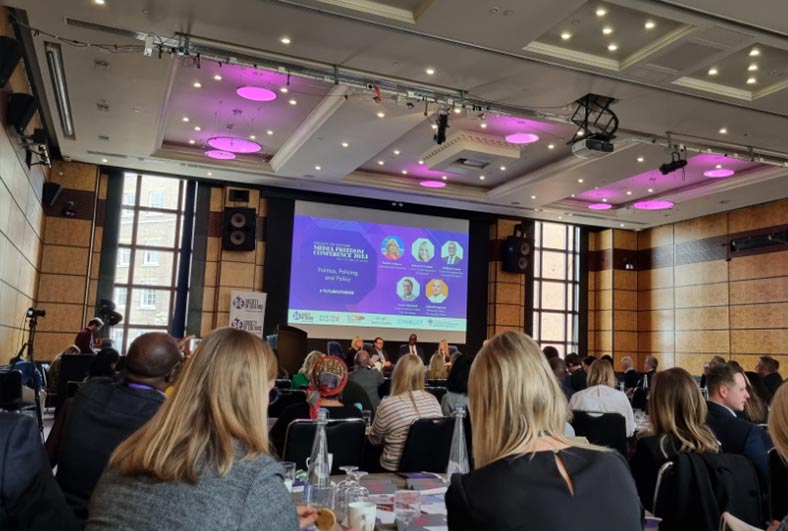Blog / Events / Journalists
What the future holds for news: Advice from the Media Freedom Conference

The media industry is constantly looking to the future. It has to consider what is working well now and what needs to be changed or adapted to stay relevant with its audience. The Society of Editors made this the focal point of its recent Media Freedom Conference with the strapline being ‘The Future of News’. Panels covered everything from reporting on the Royals, to holding power to account, to trust and transparency, and investing in mental health.
Read on to find out the key points and issues from the event:
Shifting the focus on the Royals
Another institution that is looking to the future and trying to stay relevant is the royal family. Much reporting around them in recent years has focused on the personalities but Sophie Peachey, producer and journalist at the News Movement, feels that Gen Z are more interested in the institution. Explainer articles have proved popular on their website, which is largely read by the 18-24 demographic, allowing younger audiences to understand the story of the Royals and their role in society. Russell Myers, royal editor at the Daily Mirror, said how they are trying to shift away from the click bait type content and that informed and well-written articles about the Royals works better.
There is an issue though when it comes to access. A lot of areas are restricted, making it a difficult area of reporting. Camilla Tominey, associate editor (politics and royals) at the Telegraph, said that greater access is key to be able to truly reflect what they think and who they are. This should in turn help with transparency and give the public more of an insight. Ultimately, while royal reporting is challenging, it can be a job for life as they aren’t going anywhere…
Mental health matters
Journalists are possibly under more pressure now than ever before. Editorial teams are smaller but reporters are often expected to produce more content across more formats in the same amount of time. This, along with the topics and issues that they have to cover, can put a real strain on their mental health. So, for journalism to have a future, more must be done to prioritise mental health issues.
Hannah Storm, founder and co-director of Headlines Network, said that newsrooms needed to create a culture where people feel safe to talk about mental health. This can be done via regular townhalls, where colleagues can share resources, or Google hangouts to just chat or discuss issues. Leaders can openly share any problems they have faced, to show empathy and vulnerability. Also, wellbeing workshops or sleep clinics can be a big help at relieving stress and fatigue from the job.
Rebuilding trust
The rise of misinformation has caused audiences to lose trust in news providers and outlets, and therefore the future of news has to work at rebuilding this. Sarah Whitehead, deputy head of newsgathering at Sky News, said they have tackled this by introducing more Q and As so they can open the door to the audience. Letting them get involved via social media allows them to tell their truth and call out any disinformation.
Abbianca Makoni, a freelance journalist, feels there is more trust in local reporters as people see them more often in their communities and regularly cover local stories. Young people are keen to see more collaboration between the national and local press as a result.
It’s also good for newsrooms to be as transparent as possible about their procedures and processes, and admit if and when they make mistakes. Journalists don’t want to get things wrong and Charlotte Dewar, chief executive of the Independent Press Standards Organisation (IPSO), believes that as a result of this, journalists value being held to account. There is a willingness to learn and change, and hopefully regain trust and respect.
The future is multi-channel
In our blog post last week, we discussed how media organisations would need four or five revenue streams to be successful. Linked to that, is that the future of media will be multi-channel. We already see it now with companies offering print products, a website, a podcast, newsletters, a YouTube channel and more. Professor Charlie Beckett, founding director of Polis, believes the future of news will be data. It will then be down to journalists to concentrate on the story and think about what will interest and engage the audience most.
This increase in the number of places that publishers are sharing their content means there is a huge amount for audiences to consume. Professor Beckett said that abundance is therefore the biggest problem for the media and could be causing news avoidance as a result. However, it can be a good thing for people to have a healthy news diet that they are in control of.
Sophie Smith-Galer, senior news reporter at VICE World News, feels it’s important that companies create a future proof ethos. VICE has done this by focusing on more agenda setting stories and building expertise in silos/fields that aren’t being covered by the bigger news outlets. The audience are therefore more likely to seek this out as it is content they won’t find anywhere else.